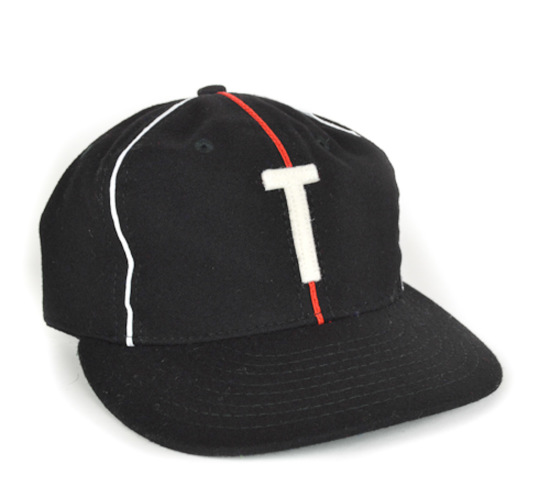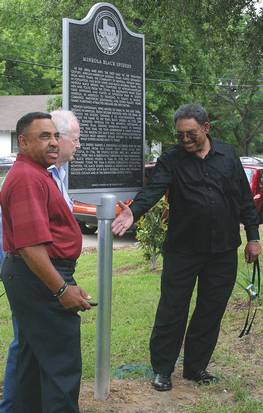Early East Texas Baseball
Part 2 of 3
The Mineola Black Spiders
Jeff Campbell
Since Americans first heard of a place called Texas, they have journeyed towards the Lone Star from the east, north & west with dreams and aspirations to start a new life. One of these Americans was Vernon V.A. Kingman; Klingman, an Iowan who settled in Mineola, Texas. Mr. Klingman arrived in Texas in the late 1920's. Not much is known about Mr. Klingman except that he was the founder of an African American baseball team in Mineola, the Black Spiders. When he first arrived in Mineola he worked a series of different jobs and his stepfather was the owner of a local restaurant. His stepfather's status gave Vernon an appearance of affluence. This appearance of influence would work to his advantage as a baseball man.
Like most towns Mineola had a white baseball team and an African American team. The African American team, made up of locals, drew about 200 fans per game. When Mr. Klingman took over the team he opened it up to outsiders, recruiting potential players from across East Texas.
Unlike their white counterparts, African American teams found they could make more money "Barnstorming" across the country instead of playing in an established league. The term "Barnstorming" originated with traveling politicians and theatre groups who would speak or perform in barns; storming meant to travel swiftly across the country.
Barnstorming teams traveled across the country playing exhibition games and this was seen as big entertainment across the country. Some of the other African Americans teams that barnstormed across the country were the Indianapolis Clowns, the Atlanta Black Crackers, the Tennessee Rats and even the Harlem Globetrotters had a barnstorming baseball team. The Mineola Black Spiders started their Barnstorming tours in 1932; setting out on a black school bus with the team's name on the side. The school bus featured a white cobweb painted on the back by a local Mineola artist.
Barnstorming players were paid a percentage of ticket sales and unfortunately this presented a problem for the Black Spiders. As July turned to August some of the players were not happy with their cut of the gate. Ten players voted to leave the team and catch on with other teams, while Klingman returned to Mineola with the remaining players. By the start of the 1933 season most of the disenchanted players had returned to the squad.
As the team traveled across the country they were advertised as the Fort Worth Black Spiders, the Black Spiders of Galveston and the Texas Black Spiders. "Galveston", "Fort Worth" and "Texas" were places much better known to people around the country than Mineola, which made the team more attractive to potential ticket buyers. Often they were referred to as the "Champions of Texas", a reference that would have been very impressive to local
fans.
In baseball circles word spread that the Black Spiders were one of the fastest teams in the south. Also every player was a showman. Frank Mitchell, the first baseman, used to tell the infielders to throw it bad, so he could show off his glove skills. One of his favorite moves was turning his back to the ball as he made the catch. Mitchell also gave advice to new Black Spiders heading out on the barnstorming circuit for the first time; "Stay out of fights because you're always on foreign turf".
Since Vernon V.A. Klingman was an Iowa native it only made sense that he used his native connections to headquarter the team. The Iowa cities of Waverly, Mason City and Charles City all at one time provided a home base for the Black Spiders. The team mainly traveled in Iowa and Minnesota from 1932 to 1937.
At one time they were entered into the National Semi-Pro Baseball Tournament as the Waverly (Iowa) Black Spiders. In 1937 Buck O'Neil stated the Spiders entered the Denver Post Tournament, where they lost to the Negro League All Stars which featured Satchel Paige and Josh Gibson. The Denver Post Tournament was for semi pro teams and attracted white, black, Native American and even Japanese teams.
As they barnstormed across the country the Black Spiders touted their victories over teams from Dallas, Fort Worth, Memphis, Houston and Little Rock. The Spiders also claimed victory over the "All Indian Baseball Club" of Holdenville, Oklahoma, which was managed by full blooded Creek Ben Harjo and a victory over the Milwaukee Giants, an independent African American team.
Eventually attracting players from outside of East Texas, they barnstormed throughout the nation in the 1930s, and traveled into Mexico with a team featuring Buck O'Neil. Buck O'Neal would go on to be one of the greatest baseball players the Negro Leagues ever produced playing from 1938 to 1955 for the Kansas City Monarchs (the New York Yankees of the Negro Leagues). Although he never broke the color line to play in the Major Leagues, Mr. O'Neil was never bitter towards baseball. He was an enthusiastic Ambassador for the game right up to his death, at the age of 94, in 2006.
Some of the other outstanding players on the Black Spiders included J.B. Griffin and Baby Tilliford. [J.B. Griffin] Baby Tilliford joined the Black Spiders in 1935. She was one of the rare female players on the barnstorming circuit. A real crowd favorite that would sell a lot of tickets, Baby would pitch the first few innings of a game before giving way to another pitcher. Newspapers of the day called her "Tillie Ford" or spelled her last name "Tilford". J.B. Griffin was the Black Spiders first ace pitcher. Soon his talent was discovered by the Kansas City Monarchs. He left the Black Spiders to join Kansas City's farm team in Louisiana, the Monroe Monarchs.
The 1930's would prove to be the glory days for the Black Spiders. By 1940 American was on the brink of a Second World War. America was learning of the atrocities committed by Japan in Asia and Hitler's murderous intentions were becoming clearer by the day. With tires being rationed, gas hard to come by, replacement auto parts scarce and automobile plants building jeeps and tanks instead of cars; barnstorming teams found travel almost impossible. The Spiders continued on in one form or another playing into the 1941 season. No records of any games are known of after 1941.
On May 21st, 2011 the Texas Historical Commission erected a historical marker in Mineola dedicated to the remembrance of the Black Spiders. The Black Spiders have not been forgotten or lost to history.
This article could not have been written without the help of Newspapers.com, Paul R. Spyhalski of the Society for American Baseball Research and Kevin Sherrington of the Dallas Morning News. *Texas Historical Marker photo by Doris Newman of the Mineola Monitor.*Texas Black Spiders hat photo by Ebbet Field Flannels


